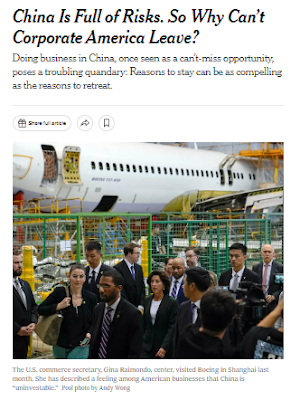Vì sao các tập đoàn Mỹ chưa thể rời Trung Quốc?
còn đang cân nhắc,
dù Trung Quốc có nhiều rủi ro, căng thẳng địa chính trị, chiến tranh thương mại, thị trường bất động sản nguy cơ đổ vỡ, hạn chế về chuyển dữ liệu, v.v...
nhưng thị trường này “too big, too important and too necessary to the U.S. economy.”
-----
...The country’s economy is floundering (suy thoái), and its relationship with the United States is strained (căng thẳng). Three years of border restrictions (hạn chế biên giới) and an effective commercial lockdown (đóng băng thương mại) have opened cracks that have yet to heal.
Nine months into the country’s post-Covid reopening, companies are grappling with (vật lộn với) a tough reality (vật lộn với): China’s $18 trillion economy is fraught with peril (nguy hiểm) but remains impossible to ignore and difficult to leave. A retreat could mean losing an edge to future global competitors. Many Western companies still see their China operations as a long-term bet, but the payoff is tempered with hazards.
...The list of worries is long. Police raids (Cảnh sát đột kích) on Western companies, steep fines, scuttled deals (giao dịch), regulations restricting data transfers and a wide-reaching counterespionage (phản gián) law have increased the costs of doing business. Other risks are known as gray swans (thiên nga xám) — rare but not unimaginable events like another pandemic, more economic sanctions (trừng phạt) or open cross-border conflict (xung đột xuyên biên giới). The concerns add up to what Gina M. Raimondo, the U.S. commerce secretary, described recently as a feeling among American businesses that China is “uninvestable.”
The fallout can be swift. Reports this week that the Chinese government is banning iPhones for employees at government agencies and other state-controlled entities sent Apple’s stock sliding 6 percent, erasing nearly $200 billion from its market value (giá trị thị trường).
...A deal by Ford Motor to license electric battery technology (công nghệ pin điện tử) from a Chinese company for a plant (nhà máy) in Michigan was a “Trojan horse” for the Chinese Communist Party, according to Virginia’s Republican governor, Glenn Youngkin, who had blocked Ford from setting up in the state.
Moderna’s decision to research, develop and manufacture mRNA medicines in China was a “betrayal (sự phản bội) of the American taxpayers whose hard-earned dollars made this technology possible,” according to Senator Marco Rubio, Republican of Florida.
And plans by Tesla to build a factory for large-scale batteries in Shanghai raised questions from Mr. Gallagher about whether Tesla was dependent on “access to the Chinese market.”
source: nytimes,



Post a Comment